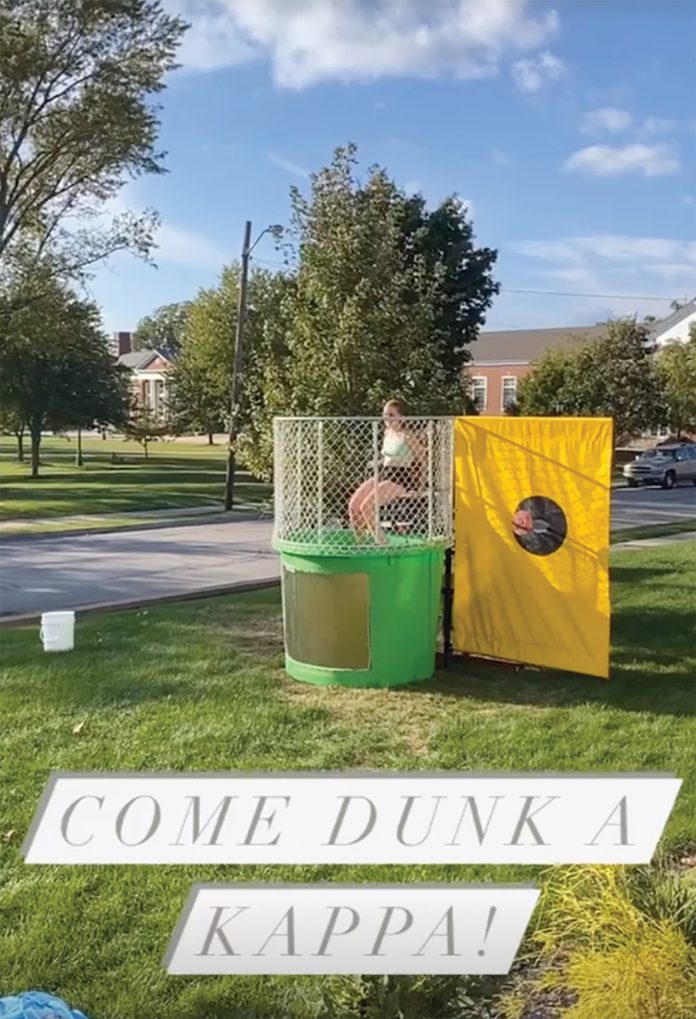
Philanthropic service is a core value of most Greek organizations. Members work year-round to support their chapter’s philanthropic efforts by holding fundraising events, volunteering in the community, and spreading awareness about the specific cause their national organization or specific chapter has chosen to support.
COVID-19 restrictions have inevitably affected many chapters’ ability to serve others in their normal ways, yet DePauw’s Greek community has remained committed, adapting to the pandemic and continuing to support a variety of organizations.
Alpha Tau Omega’s (ATO) philanthropy is toward men’s mental health and suicide awareness. Members work to raise funds for organizations that support this mission as well as eliminate the stigma behind the topic.
Sophomore Sam Renggli, ATO’s philanthropy chair, said they’ve specifically chosen to sponsor the organization Movember, as they “acknowledge the exponential increase in men's mental health issues and suicide numbers and devote many resources to mitigate those numbers and help those who are affected by this.”
Renggli said that normally their house holds a variety of events to raise money for their cause such as “Egg-a-Tau” or their annual cookout, but due to limits on in-person gatherings, they have been unable to hold any of their regular fundraisers.
In order to continue supporting their cause, last semester they decided to hold an online fundraiser through Instagram. Members created bingo board-style graphics to post with different dollar amounts in each square, asking their followers to help them fill their board by Venmoing them a certain amount in support of men’s mental health and suicide awareness.
Despite the fact they had to adapt from their previous efforts, Renggli said the fundraiser was a huge success. This semester, with lighter restrictions on in-person events, Renggli said they’re going to return to their typical philanthropy events.
In addition to supporting their cause through fundraising, Renggli said that as a house they have worked to create an environment that mirrors their philanthropic mission by eliminating the stigma around men's mental health. “I think many brothers have found comfort in having vulnerable conversations with each other, something that is now heavily encouraged, but of course not forced,” Renggli said. “It's easier going through things together, not alone.”
Kappa Kappa Gamma’s philanthropy is also focused on supporting mental health, with DePauw’s chapter specifically supporting Mental Health America Putnam County, an organization that works to educate the public on mental health conditions and reduce barriers to treatment.
Tessa Freeman, Kappa’s philanthropy chair, said this year Kappa’s nationals made the decision to switch their focus to supporting mental health-related organizations as they saw how important mental health education is on college campuses, especially in light of COVID-19. “We as a chapter are so excited to be able to contribute to a cause that hits close to home for many DePauw students,” Freeman said.
Freeman said that while the pandemic made it difficult to hold engaging and accessible service and fundraising events, she said it also taught her chapter that “we can always find new and innovative ways to do things, especially when it comes to helping others.”
Last year, their annual “Kappa Kakes” event in partnership with Alpha Kappa Alpha selling pancakes the morning of Little 5 was completely canceled due to COVID-19, so Freeman said they’re looking forward to having the event year, “just with more safety precautions.”

Lydia Dessauer, former director of service and philanthropy for Pi Beta Phi, was tasked with the challenge of finding ways to continue philanthropic service during the height of the pandemic in 2020.
Before COVID-19, one way members of Pi Phi supported their mission of children’s literacy was through the Champions Are Readers program. The women would volunteer at a local Greencastle elementary school, reading to and reading with children of various ages weekly.
In an effort to eliminate the spread of COVID-19, they had to temporarily pause their volunteer program, prompting Dessauer to think of new ways to promote children’s literacy. Turning to the web, Pi Phi members did an online book drive called ‘Books for Change’, focusing on books written and illustrated by authors of color to promote diversity within literacy. They also did ‘Storytime with Pi Phi’, where members read their favorite storybook and uploaded it to a YouTube channel to share with kids in the community.
“Because our members loved reading to the kids so much, we really wanted to keep doing some type of reading thing,” Dessauer said. “Even though we couldn’t create bonds with the kids like normal, it was nice to give back to them in a different way.”
